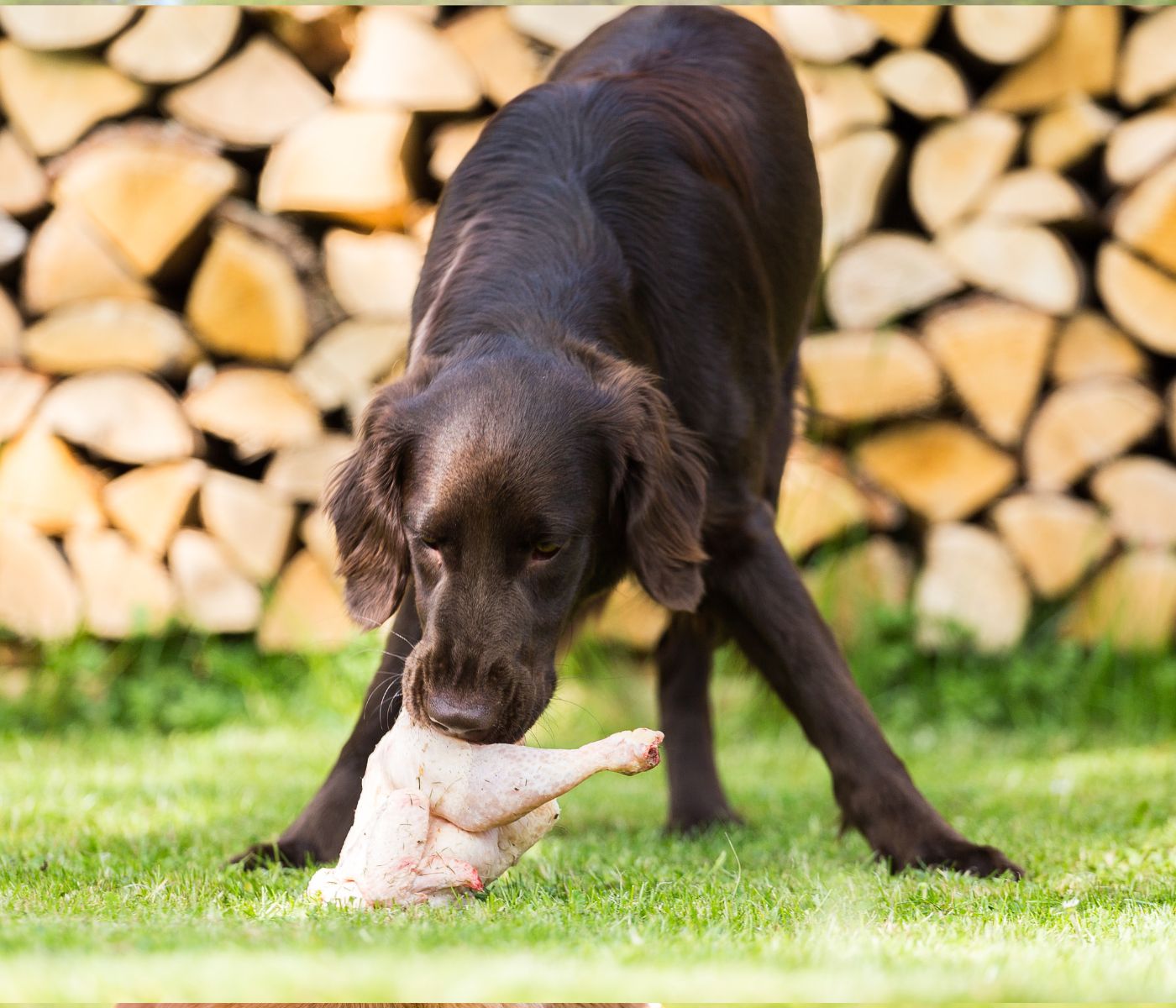Chicken skin is a common ingredient in many dog foods. However, there is some debate about whether or not chicken skin is terrible for dogs. Some people believe that chicken skin can be hard to digest and cause health problems for dogs.
Others believe that chicken skin is a healthy source of protein and fat for dogs. So, what is the truth? Is chicken skin terrible for dogs?
Chicken skin is high in fat, and feeding too much to your dog can lead to weight gain and obesity. Fatty foods can also increase the risk of pancreatitis in dogs. Pancreatitis is a severe condition that can be fatal.
In addition, chicken skin contains cholesterol, which can contribute to heart disease in dogs.
Chicken skin that is fried or baked may be more problematic for dogs to digest and may contain more unhealthy fats than boiled or grilled chicken skin.
Talk to your veterinarian if you’re unsure whether to feed your dog chicken skin. They can help you determine if chicken skin is suitable for your dog based on its individual health needs.
Is Chicken Skin Bad For Dogs?

As with any food, there are pros and cons to feeding chicken skin to dogs. On the one hand, chicken skin is a good source of protein and fat. It also contains glucosamine and chondroitin, which are joint-supporting nutrients that can be beneficial for dogs with arthritis or other joint problems.
On the other hand, chicken skin is high in fat and calories, contributing to weight gain. It can also be hard to digest, mainly if your dog isn’t used to eating it. And because it’s raw, there is a risk of foodborne illness from bacteria like salmonella or campylobacter.
So, Can dogs eat Chicken skin?
No, dogs should not eat chicken skin. While chicken meat is safe for dogs to eat, the skin is not. Chicken skin is high in fat and can cause digestive issues for dogs. Additionally, chicken skin can be a choking hazard. If you’re looking to give your dog a treat, many other options are both safe and healthy.
Can dogs eat Raw Chicken skin?

No, dogs should not eat raw chicken skin. Raw chicken skin can contain bacteria that can make your dog sick. If your dog does eat raw chicken skin, watch for signs of illness, such as vomiting or diarrhea and contact your veterinarian if your dog becomes ill.
Raw chicken skin can also be a choking hazard for dogs. If your dog does eat raw chicken skin, be sure to monitor your dog closely and remove any pieces of chicken skin that could cause your dog to choke.
What are the Health Risks associated with Chicken skin for dogs?

There are a few health risks associated with chicken skin for dogs.
- First, chicken skin is high in fat. Too much fat can lead to pancreatitis, a severe and potentially life-threatening condition.
- Second, chicken skin can be a choking hazard. If your dog swallows a large piece of chicken skin, it could get stuck in its throat and block its airway.
- Third, chicken skin can contain harmful bacteria that can make your dog sick. If your dog eats chicken skin that has not been properly cooked, it could develop food poisoning.
- Fourth, chicken skin can cause an upset stomach in some dogs. If your dog is prone to digestive issues, it may experience vomiting or diarrhea after eating chicken skin.
- Finally, chicken skin can be a choking hazard. If your dog swallows a large piece of chicken skin, it could get stuck in its throat and block its airway.
Overall, chicken skin is not the best treatment for dogs. While it may be safe for some dogs to eat in small quantities, it’s best to avoid giving it to your dog altogether.
What to do if my dog ate Chicken skin?

If your dog ate chicken skin, you should do a few things.
- First, observe your dog for any signs of distress or illness. Contact your veterinarian immediately if your dog seems to be in pain, vomiting, or having diarrhea.
- Next, try to determine how much chicken skin your dog ate. There is likely no cause for concern if it was a small amount. However, if your dog ate a large amount of chicken skin, he may be at risk for developing pancreatitis or other health problems.
- If your dog has eaten chicken skin, monitoring his stool for any signs of gastrointestinal upset is essential. Contact your vet if you notice any changes in stool consistency or frequency.
- Finally, make sure to offer your dog plenty of fresh water to drink and avoid giving him any fatty foods until his digestive system has had a chance to recover.
What are the Alternatives to Chicken Skin for Dogs?
As we’ve seen, some health risks are associated with feeding your dog chicken skin. So what are some alternatives?
- Lean Meats: There are leaner options, such as turkey and rabbit. Just make sure to remove the skin before cooking.
- Fish: Fish is an excellent option for dogs as it’s packed with healthy omega-3 fatty acids. Again, remove the skin before cooking.
- Vegetables: You can also mix some shredded vegetables, such as carrots or zucchini. This adds extra nutrients and fiber to your dog’s diet.
- Yogurt: Plain yogurt is a good source of protein and calcium for dogs. Just be sure to avoid varieties high in sugar or artificial sweeteners.
- Store-Bought Dog Food: Many brands of commercial dog food do not contain chicken skin or other unhealthy ingredients. Just be sure to read the label carefully before purchasing.
FAQs:
Q: Is fried chicken skin terrible for dogs?
A: While fried chicken skin is not necessarily bad for dogs, it is not the healthiest option. Fried foods are generally high in fat and calories, leading to weight gain and other health problems.
Additionally, the frying process can cause the formation of harmful chemicals called acrylamides. Therefore, it is best to avoid feeding your dog fried chicken skin.
Q: Is baked chicken skin suitable for dogs?
A: Baked chicken skin can be a healthy treat for your dog if cooked without added fats or oils. However, some people choose to bake their chicken with spices or other seasonings that may not be safe for dogs. Therefore, checking with your veterinarian before feeding your dog baked chicken skin is essential.
Q: Is chicken skin hard to digest?
A: Chicken skin is composed of keratin, a protein that is difficult for dogs to digest. All animals cannot break down keratin into its component amino acids. As a result, dogs may experience gastrointestinal upset when they eat chicken skin, including vomiting and diarrhea.
Therefore, it is best to avoid feeding your dog chicken skin unless directed by your veterinarian.
Q: Is chicken skin fat or protein?
A: Chicken skin consists of both fat and protein. Approximately 50% of the dry weight of chicken skin is made up of fat. The remaining 50% consists of protein and other nutrients such as water, minerals, and vitamins. Because chicken skin is high in fat, it should be fed in moderation as part of a balanced diet.
Q: Which part of chicken is suitable for dogs?
A: The meat of the chicken is the best part for dogs. Chicken skin and bones should be avoided as they can pose a choking hazard and cause gastrointestinal upset. Additionally, fatty parts of the chicken, such as the thighs and wings, should be fed in moderation due to their high-fat content.
